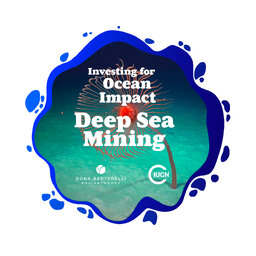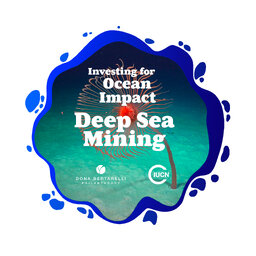Investing For Ocean Impact
The Earth is in trouble. But the ocean can help. When it comes to tackling climate change and the biodiversity crisis, the ocean and the world’s coas…Why have some multinational companies pledged not to use minerals sourced from deep sea mining?
Today several major companies such as Volvo, BMW, and Samsung have joined over twenty-five countries in calling for a moratorium on deep sea mining. They have agreed not to source any minerals from the seabed for their entire supply chain of production, including for batteries and electric vehicles, until risks are fully understood and can be responsibly managed.
In the second episode of this miniseries we discuss the reasons behind these decisions; what factors – practical, financial, or environmental - businesses are considering; and whether deep sea mining makes economic sense.
With thanks to Eva Bennis, Director of Sustainability at Volvo Group Purchasing; and Rashid Sumaila, Professor of Interdisciplinary Ocean and Fisheries Economics at the University of British Columbia.
Investing For Ocean Impact is a Fresh Air Production on behalf of the International Union for Conservation of Nature and Dona Bertarelli Philanthropy. It is presented and produced by Phil Sansom.
The views and opinions expressed by guests on this podcast are their own and do not represent the views and opinions of IUCN or Dona Bertarelli Philanthropy.
FURTHER READING:
To engage in deep-sea mining or not to engage: what do full net cost analyses tell us? (Sumaila et al., 2023)
DSM is rife with technical challenges and overlooks innovations: Investors think twice (the Ocean Foundation, 2024)
High levels of investment in mining and refining have ensured that global supply can meet demand today (Global EV Outlook, 2024)
How to Lose Half a Trillion, Deep Sea Mining, Financial Risk & Reward, Greenwashing, Transparency & Traceability, Equity (Planet tracker, 2024)
Companies and financial institutions endorsing the Business Statement supporting a moratorium on Deep Sea Mining (Nautilus, 2023)
Critical minerals and the green transition, do we need to mine the deep seas? (Environmental Justice Foundation)
In 1 playlist(s)
Investing For Ocean Impact
The Earth is in trouble. But the ocean can help. When it comes to tackling climate change and the b…Social links
Follow podcast
Recent clips

3. Deep Sea Mining: The Growing Wave?
32:37

1. What is Deep Sea Mining?
29:17

10. Blue Finance on the International Agenda for Nature and Humanity
41:46
 Investing For Ocean Impact
Investing For Ocean Impact